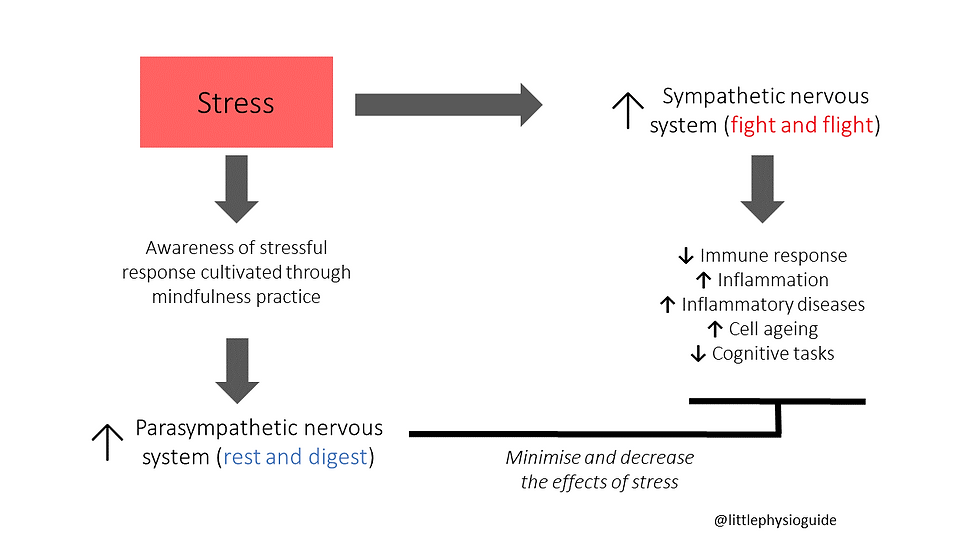Brain Exercise & Maintenance
- The Little Physio
- May 17, 2019
- 4 min read
Picture this...stressful day at work
In a regular day as a physiotherapist, it is not uncommon to consult with 12+ clients/patients in addition to planning out sessions, completing clinical notes, creating exercise programs, tackling reports, replying to emails, sending out new emails, calling clients and doctors, writing referrals, requesting an order for equipment ...writing letters back to GPS...the list can be endless. Plus, within each consultation you’re tailoring advice and education to the individual and managing people in pain. This is, of course, on top of fitting in lunch
So it can be a situation that embodies a stressful ‘fight and flight’ response, an experience where we feel like we do not have the resources to meet those demands. Stress, as we have come across in a previous post, has deleterious side effects on our health.
As physiotherapists we are acutely aware of the benefits of exercise for the body. What we might not explore as often but which is equally important for health is how can we exercise and maintain our mind. A part of the answer lies in mindfulness based practice for good health for the mind and a way to build our resources to manage stress.
What is mindfulness?
Mindfulness is defined by three components: focused attention, open awareness and kindness. It is about approaching the present experience with equanimity (calmness and composure) and acceptance. It not an acceptance with a defeatist view, rather it is about being open to the experience and not labeling the thoughts and feelings as ‘good’ or ‘bad’. With mindfulness the notion is catch the wandering mind and bring it back to the present moment. The wandering mind is one that can be stuck ruminating on past events, thinking about emotions or anticipating future events, often laced with stress and anxiety. And a wandering mind has been found to be a predictor of unhappiness, whilst the capacity to be mindful shows better wellbeing.
What’s in it for you?
Immune system
The research suggests there is improved immunity with mindfulness based practice. An example is seen with an 8 week program with three groups consisting of mindfulness based practice, aerobic exercise or a control group. There was no change in illness outcome in that there were no difference in the number of acute respiratory illnesses reported between groups. However, the meditation group reported fewer days taken off work compared to both exercise and the control group. It is important to note with aerobic exercise, the number of days off work was still lower than the control group but not to the same degree as the mindfulness group.
Cognition and mental health
Mindfulness practice has shown there is increased sustained attention, working memory and problem solving when compared to relaxation and incentivised groups in cognitive tasks. Additionally, in individuals who have had more than 2-3 depressive episodes, mindfulness practice decreases relapse by 50 percent (as cited in Creswell 2017).
Cell ageing
In cell biology, one can determine the age of a cell by looking at the length of telomeres. Telomeres are areas of DNA at the end of chromosomes that protects DNA from abnormalities that can arise during processes such as cell division. With repeated cell division, typically the length of the telomere decreases.
Telomere length is shorter in those with higher levels of stress. In zen meditators and with loving compassion meditation, these groups have longer telomere length, suggesting a decrease in the acceleration of the cell ageing process. Taken together and proposed by telomere researcher, Elizabeth Blackburn, mindfulness practice may shift one into a positive mind state and positive arousal state, which promotes vagal tone and hormones implicated in healthy telomeres. Thus, mindfulness fosters healthy cell ageing by shifting the perception of stress through insight and emotional regulation.
Shift the stress with mindfulness

Figure 1 shows how mindfulness can potentially attenuate the effects of a stress response with mindfulness. By shifting the response to more or a parasympathetic drive one can potentially minimise some of the harmful effects of stress.
As one can see there are vast benefits to your health with mindfulness practice. Mindfulness can be seen as exercise for the mind with positive effects within physiological systems to minutiae details such as cell biology. As physiotherapists, we often think about the benefits of exercise and see exercise as medicine for the body. How about adding mindfulness practice to your day to reap whole mind and body benefits? Mindfulness could very well be medicine for the body too. And who would say no to something as easy to access as our own awareness and the physiological benefits of mindfulness?
Thanks for reading!
Resources for further information
Killingsworth and Gilbert 2010 - A wandering mind is an unhappy mind
Brown and Ryan 2003 - The Benefits of Being Present: Mindfulness and Its Role in Psychological Well-Being
Barrett et al. 2012 - Meditation or Exercise for Preventing Acute Respiratory Infection: A Randomized Controlled Trial
Epel 2009 - Can meditation slow rate of cellular aging? Cognitive stress, mindfulness, and telomeres
Elizabeth Blackburn Ted talk - The science of cells that never get old
Creswell 2017 - Mindfulness Interventions
Alda et al. 2016 - Zen meditation, Length of Telomeres, and the Role of Experiential Avoidance and Compassion
Hoge et al. 2013 - Loving-Kindness Meditation practice associated with longer telomeres in women





Comments